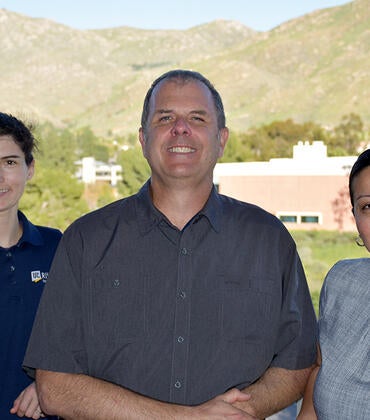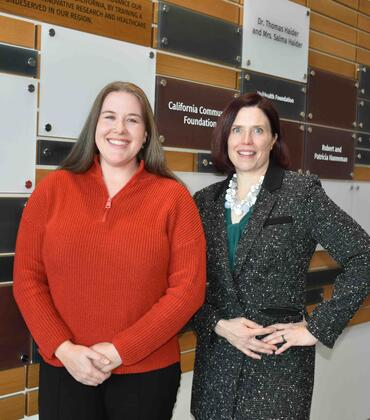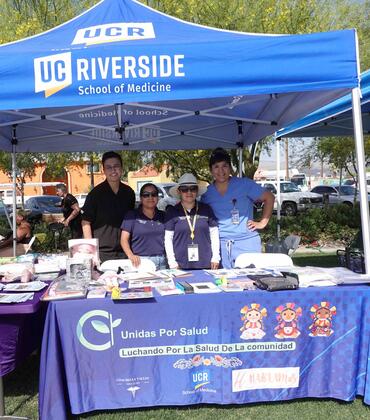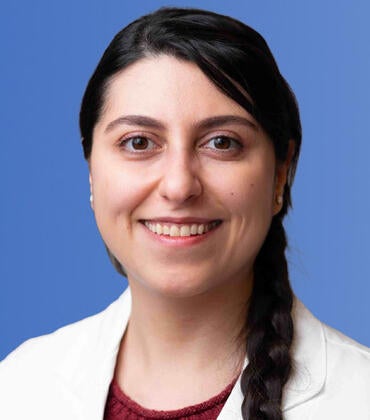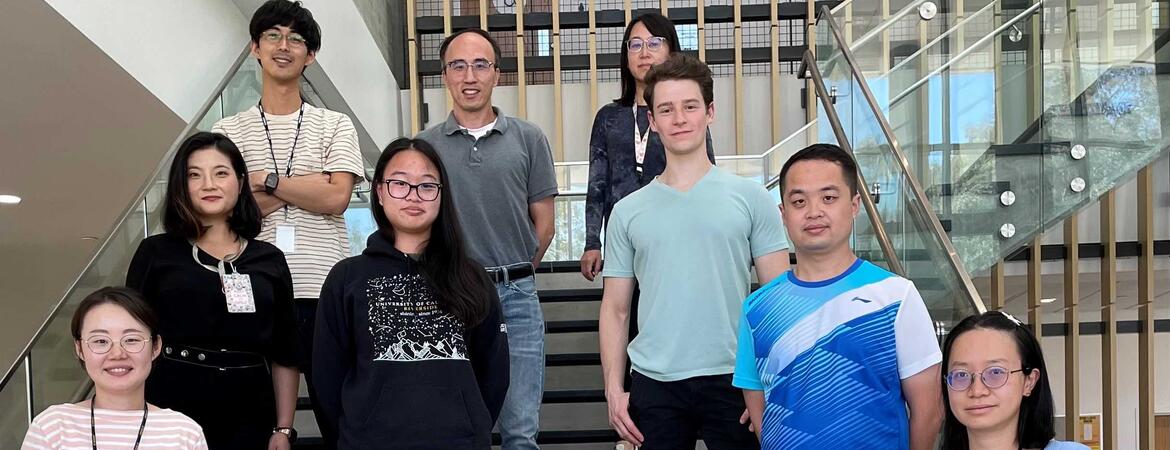
As a child, Sika Zheng, PhD, founding director of the Center for RNA Biology and Medicine and a professor of biomedical sciences at the UC Riverside School of Medicine, was fascinated by the cycle of life and death. While he initially planned to become a physician, his curiosity about the process from birth to decay and the workings of the brain led him to pursue a PhD in neuroscience at Johns Hopkins University with a focus on neurodegeneration.
“In the lab at that time, most people were trying to study how neurons died,” Zheng recalled. Yet rather than focusing on neurodegeneration in conditions like Parkinson’s disease and stroke, he continued, “I started thinking about how you can make neurons live longer and finding protective mechanisms.”
Tiny cells, significant impact
This focus on neuronal longevity became the basis for Zheng’s career. While there’s constant turnover of other cells in the body, the same neurons remain with each person throughout their lifespan. Zheng dove into examining neurons at the molecular level during his postdoctoral research at UCLA and began investigations into alternative RNA splicing, essentially the cellular process that allows a gene to produce multiple RNA molecules of different sequences and functions in different cells. (RNA is the copy of a cell’s DNA that translates genetic code to create proteins and drives other cell processes.)
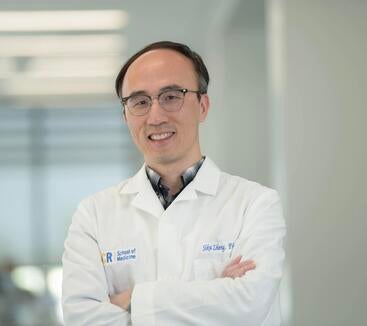
“At the time, little was known about the functional significance of alternative splicing even though this process had been studied in great detail at a biochemistry level,” Zheng said. “Very rarely was it being investigated in a system, in a live animal, so that's where I joined in.”
Zheng focused on bridging the fields of RNA and neuroscience to make new discoveries, an objective he continued to pursue when he joined the UC Riverside School of Medicine in 2014. “Before I started, the RNA field and neuroscience field didn't really talk to each other,” he explained. Bringing them together allowed him to investigate unique RNA regulations in the brain and, conversely, unveil the specific contributions of neural specific splicing to brain biology.
In Zheng’s lab at UCR, he has investigated neuronal longevity by looking into aspects including the impact of neurological diseases on RNA and the effects of specific gene splicing on cell death pathways, including apoptosis, or programmed cell death. His research in this area may benefit health issues in the community and beyond, building on the UCR SOM’s commitment to improve health in the region.
“Our research has a broad impact, first for fundamental knowledge but also potentially for neurological and neurodegenerative disease,” Zheng said. “Some of these diseases are quite overrepresented in the area. So even though we may not be immediately making therapeutic interventions or designing therapeutic strategies, our research is highly relevant.”
He has also shared his research results with the community, recently visiting the UCR Palm Desert Center to give a talk on his findings and connect with residents. “From feedback we got, it was pretty well received, and there was a lot of interest in our discoveries,” he said. “More broadly speaking, I think we're all trying to increase UCR’s visibility and by doing that, enhance UCR's capacity to serve the Inland Empire better.”
Putting UCR on the map with a new RNA center
Conducting groundbreaking research while promoting UCR are also goals behind a new interdisciplinary center Zheng founded, the UCR Center for RNA Biology and Medicine. The center includes three dozen labs from four colleges across the campus: the School of Medicine (SOM), the College of Natural & Agricultural Sciences (CNAS), the Marlan and Rosemary Bourns College of Engineering (BCOE), and the College of Humanities, Arts, and Social Sciences (CHASS).
“We want this center to be the innovation hub of UCR as we bring people together and create science that individual labs would not necessarily be able to generate, and through that train lots of next-generation scientists,” said Zheng, who serves as the center’s director. “I've been putting in lots of effort with my RNA colleagues to jumpstart the center and make it happen, and feel like it is a new baby for my journey,” he added. “I really look forward to its success.”
The center began with an inaugural RNA Symposium in November 2022. Adrian R. Krainer, PhD, who won the 2019 Life Sciences Breakthrough Prize, presented the keynote lecture, with speakers from universities across California in attendance. Zheng said he hopes to make the symposium an annual event, but said the center has already succeeded in raising UCR’s profile.
“People started realizing we are UC Riverside, not UC Irvine,” he recalled. “Now, they know that we have an RNA center here at UC Riverside.”
The center brings together RNA researchers from across UCR’s campus to combine, organize, and strengthen their efforts. “We provide a platform… to get together to talk about research on RNA and exchange ideas,” Zheng said. While a couple of RNA researchers had previously tried to organize smaller initiatives to facilitate working together, Zheng said the lack of funding and being spread out among various departments made it unsustainable.
“Now, I am using the center’s funds to kickstart something to put many more research groups together,” Zheng said. “It's exciting because we want to build something new.”
Zheng has already seen the center make a difference on campus as well. Several UCR researchers who had never studied RNA biology had their first grants on RNA research awarded at the end of 2023 and the beginning of 2024. “Those are examples that the center is promoting individual investigators directly and then also helping the university to boost their visibility,” Zheng said.
Mentoring the “true heroes” of science
Zheng’s dedication to his research is clear, but so is his commitment to his students and trainees.
Zheng said he enjoys working with students and postdocs both in and out of the lab. “They are the true heroes behind all of these scientific discoveries,” he pointed out, noting that students and postdocs are often the ones handling pipettes or taking care of animals in the lab.
“It's great to see that your advice and guidance can have some positive influence,” Zheng added. “To see how they transform with your input over time--I really cherish those moments, particularly when some of them work with you for many years.”
David Nikom, now a doctoral candidate in his fourth year, joined Zheng’s lab during his first year of graduate school. Nikom recalled Zheng encouraging him to develop a class paper on alternative RNA splicing in disease into a textbook chapter. “After sending him my revised draft he said it deserved to be in a journal, rather than [as a] book chapter, which felt amazing,” Nikom said. They published the review paper together in Nature Reviews Neuroscience in 2023.
“Dr. Zheng sets the bar high because he knows you can reach it,” Nikom said. “It’s easier to work hard when your mentor leads by example, and Dr. Zheng embodies a work ethic and discipline that I hope to achieve in my own research career.”
Zheng said he learns from his students, too, such as former graduate student John Vuong, PhD. "John spearheaded developing a new sophisticated lab technique in the absence of local expertise," said Zheng. He added, however, that Vuong was misunderstood by some individuals who didn’t realize that his late arrivals to work reflected long nights in the lab rather than a lack of dedication to his work. Similarly, while Vuong’s research ideas were strong, Zheng said his initially modest presentation skills contributed to him getting some negative feedback from his thesis committee.
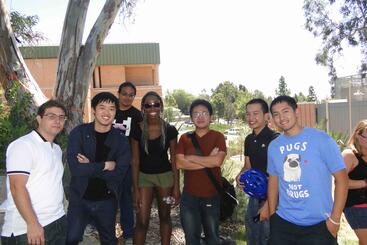
“John taught me that we should give students some freedom to explore,” Zheng said of Vuong, who went on to become a scientist at the biotech company Thermo Fisher Scientific. “At a certain point you feel like, this is going to be a student who needs a lot of hand-holding in one way or another,” he continued. “But it turns out that if you just let him be himself, he knows what he's doing. With some coaching and mentoring, like teaching him how to do a presentation, he will shine.”
For his part, Vuong recalled Zheng’s evident excitement when Vuong made a breakthrough in a project that later became his dissertation. "As a researcher, Sika was at times demanding but helped instill values of perseverance, accountability, and attention to detail," Vuong said. "Sika was supportive in my time as a budding researcher in providing key insights and lessons leading to breakthroughs in my dissertation and was instrumental as a mentor helping me earn my PhD."
In the end, Zheng said, the goal is to do good science while simultaneously setting each student up for the future with a solid scientific background. “Most importantly, when experiments fail, we don't want a student to fail,” Zheng said. “We want to train them in a way that even if the experiment fails, they can still be a scientist or at least have a scientist's mind with critical and independent thinking.”
This remains true, he added, even if the student ends up pursuing a different career path. “It's our job to really train their scientific mind, for them to analyze and understand things in a scientific way,” he said. “Even if they don't necessarily stay in academia, if they're equipped with that kind of mindset, I think they're going to do good things in the world.”
